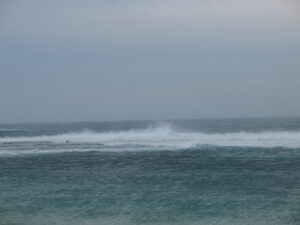
I’m watching events relating to Britain’s position in Europe with a kind of horrible fascination. Chronologically, my work concerns the period when the land that would become the UK was merely a mountainous, largely ice-girt, peninsula on the north west of the continent that we call ‘Europe’. I realise that this has biased my point of view.
This was the time of Doggerland. The communities who lived here were highly mobile and likely to have known an extensive and varied terrain that ranged across several of the units we now call independent countries. It is likely that many communities did not live in the Scottish area permanently. Of course, they were not subject to the pressures of people and resources in the same way that we are today. But pressure is relative and I have a gut feeling that they may have felt that the uncertainties that they did experience – such as the availability of enough food, poor weather, worries over increasing populations, or the advent of newcomers – were, in fact, just as much of a threat to their wellbeing.
Over time, as we know, the land mass did actually diminish and population expand. This must have been an issue for the worriers of the time. In their 2013 paper Fraser Sturt and colleagues estimate that the Dover Straits were breached between 8000 and 7500 BP and that within 500 years of this the last traces of Doggerland had disappeared. From this point onwards Britain was an island and the island mentality could start to develop. Contact with those on the continental landmass did not cease, but the development of insular ways of doing things and insular beliefs was, perhaps, inevitable.
And yet.
At no time during the long history of island Britain have we ceased to absorb newcomers. Of course, it is human nature to fear change and the possibilities of instability that it brings. You only have to read the wealth of literature (both old and new) that takes culture clash as a driving theme to realise just how much established communities would prefer to live in the status quo. It is also notable, however, just how much the introduction of new ways has enriched our society down the millennia. So much so, in fact, that we have seemingly forgotten the foreign origins of some of the aspects of life that are today regarded as quintessentially British. Wikipedia informs me that the first known English record of tea occurs in a letter written in 1615 by one Richard Wickham, who ran an East India Company office in Japan.
I’m not sure what we’d be left with if we stripped out all non-indigenous aspects of our lives today – the first people in Britain after the Ice Age were, after all, incomers.
OK, I know my views are naïve. I know that the debate today is about global economics and mass movement of peoples. But I’m more of an optimist than some. I still believe, or believed, that we could find solutions to the apparent problems we thought we faced. For now, I mourn the loss (temporary I hope), of the easy diversity we embraced. I enjoyed the advent of new foods into my local supermarket. I envied the opportunities for study abroad and the experience of new cultures that our young folk could take advantage of. I was happy to benefit from EU research grants and the funding that assisted local areas. And I welcomed the opportunity to meet people from different places, whether they were sorting my plumbing, sharing a shopping queue, or sitting in the cinema. I’m reassured that the powers-that-be assure me we will get it all back with new and better deals. I have to believe in them. I admit to occasional late night skepticism, and I’m depressed by the thought that it will involve the work (and cost) of thousands of bureaucrats over several years. Was it really worth unpicking?
For now, I can escape to the world of work, to a time when Britain, truly, physically, was a part of Europe. When to be European was not just a mind-set, but rather an intrinsic part of our being. Perhaps I’m just a Doggerland-o-phile.
You must be logged in to post a comment.